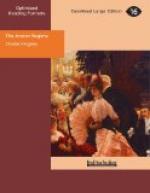Whether these complaints affected the French Church as a “religious” institution, must depend entirely on the meaning which is attached to the word “religion”: that they affected her on scientific, rational, and moral grounds, independent of any merely political one, is as patent as that the attack based on them was one-sided, virulent, and often somewhat hypocritical, considering the private morals of many of the assailants. We know—or ought to know—that within that religion which seemed to the philosophes (so distorted and defaced had it become) a nightmare dream, crushing the life out of mankind, there lie elements divine, eternal; necessary for man in this life and the life to come. But we are bound to ask—Had they a fair chance of knowing what we know? Have we proof that their hatred was against all religion, or only against that which they saw around them? Have we proof that they would have equally hated, had they been in permanent contact with them, creeds more free from certain faults which seemed to them, in the case of the French Church, ineradicable and inexpiable? Till then we must have charity—which is justice—even for the philosophes of the eighteenth century.
This view of the case had been surely overlooked by M. de Tocqueville, when he tried to explain by the fear of revolutions, the fact that both in America and in England, “while the boldest political doctrines of the eighteenth-century philosophers have been adopted, their anti-religious doctrines have made no way.”
He confesses that, “Among the English, French irreligious philosophy had been preached, even before the greater part of the French philosophers were born. It was Bolingbroke who set up Voltaire. Throughout the eighteenth century infidelity had celebrated champions in England. Able writers and profound thinkers espoused that cause, but they were never able to render it triumphant as in France.” Of these facts there can be no doubt: but the cause which he gives for the failure of infidelity will surely sound new and strange to those who know the English literature and history of that century. It was, he says, “inasmuch as all those who had anything to fear from revolutions, eagerly came to the rescue of the established faith.” Surely there was no talk of revolutions; no wish, expressed or concealed, to overthrow either government or society, in the aristocratic clique to whom English infidelity was confined. Such was, at least, the opinion of Voltaire, who boasted that “All the works of the modern philosophers together would never make as much noise in the world as was made in former days by the disputes of the Cordeliers about the shape of their sleeves and hoods.” If (as M. de Tocqueville says) Bolingbroke set up Voltaire, neither master nor pupil had any more leaning than Hobbes had toward a democracy which was not dreaded in those days because it had never been heard of. And if (as M. de Tocqueville heartily allows) the




